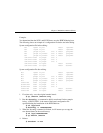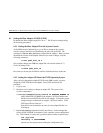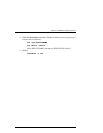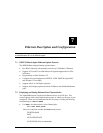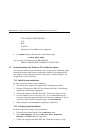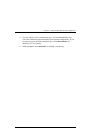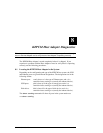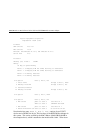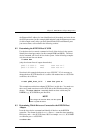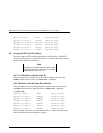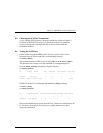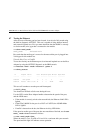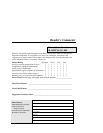
KZPCM PCI–to–Dual Channel Ultra SCSI and 10/100MB Ethernet Host Adapter
8–4 EK–KZPCM–UG. B01
dkb0.0.0.3000.0 DKB0 RZ1CB-CS 0656
dkc100.1.0.3001.0 DKC100 RZ1CB-CS 0656
dkc1000.10.0.3001.0 DKC1000 RZ1CB-CS 0656
dkc200.2.0.3001.0 DKC200 RZ1CB-CS 0656
dkc500.5.0.3001.0 DKC500 RZ1CB-CS 0656
dkc600.6.0.3001.0 DKC600 RZ1CB-CS 0656
8.4 Locating SCSI Device ID Conflicts
The most common SCSI configuration problem is an ID conflict. Each SCSI
device on a port must have a unique ID from 0 – 15, which cannot be the same as
the host ID or that of any other drive.
Note
By default and convention the host is always at ID
7 and disks start at ID 0. UNIX does not currently
support drives at IDs from 8 – 15.
8.4.1 Two Disk Drives with the Same ID
The most common result of having two disk drives with the same ID is that
neither
of them shows up at the >>>
show dev
command.
8.4.2 Disk Drives with the Same ID as the Host
The most common result of having disk drives with the same ID as the host is
that
none
of the disk drives shows up at the >>>
show dev
command.
>>>
show dev
dkb0.0.0.3000.0 DKB0 RZ1CB-CS 0656
dkb100.1.0.3000.0 DKB100 RZ1CB-CS 0656
dkb200.2.0.3000.0 DKB200 RZ1CB-CS 0656
dkb300.3.0.3000.0 DKB300 RZ1CB-CS 0656
dkb400.4.0.3000.0 DKB400 RZ1CB-CS 0656
dkb500.5.0.3000.0 DKB500 RZ1CB-CS 0656
dkb600.6.0.3000.0 DKB600 RZ1CB-CS 0656
In this example a disk drive was set to the host ID of 7. There is actually only 1
disk drive on the bus, but it responds at each ID.



